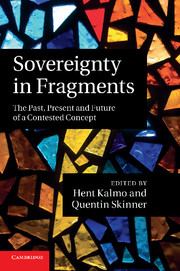Book contents
- Frontmatter
- Contents
- Notes on contributors
- Acknowledgements
- Introduction: a concept in fragments
- 1 The sovereign state: a genealogy
- 2 The apparition of sovereignty
- 3 The Westphalian myth and the idea of external sovereignty
- 4 Double binds: sovereignty and the just war tradition
- 5 The durability of organized hypocrisy
- 6 A matter of fact? The many faces of sovereignty
- 7 The survival of sovereignty
- 8 Sovereignty and after
- 9 Prolegomena to the post-sovereign Rechtsstaat
- 10 Sovereignty beyond the state
- 11 Sovereignty between government, exception and governance
- 12 Conclusion: vocabularies of sovereignty – powers of a paradox
- Bibliography
- Index
7 - The survival of sovereignty
Published online by Cambridge University Press: 04 February 2011
- Frontmatter
- Contents
- Notes on contributors
- Acknowledgements
- Introduction: a concept in fragments
- 1 The sovereign state: a genealogy
- 2 The apparition of sovereignty
- 3 The Westphalian myth and the idea of external sovereignty
- 4 Double binds: sovereignty and the just war tradition
- 5 The durability of organized hypocrisy
- 6 A matter of fact? The many faces of sovereignty
- 7 The survival of sovereignty
- 8 Sovereignty and after
- 9 Prolegomena to the post-sovereign Rechtsstaat
- 10 Sovereignty beyond the state
- 11 Sovereignty between government, exception and governance
- 12 Conclusion: vocabularies of sovereignty – powers of a paradox
- Bibliography
- Index
Summary
The history of the modern world is closely linked to the birth, growth and triumph of the political form known as the sovereign state. However, for more than half a century, a number of prominent thinkers have been talking of a decline or a crisis of the state. Several books have been explicitly entitled ‘the crisis of the State’. Their authors agree on the symptoms of the crisis, which are both internal and external. They include the development within the state of powerful economic or social forces; the decline of public services and the increasing privatization of public corporations; the loss of control of the economy by the state and domination by the market; the fact that, in several countries, many important activities are regulated not by the state but by independent agencies; the developing role of minorities; and the dramatic changes that they see in the legal system because of such phenomena as the growing importance of international organizations or legal pluralism. Even the rule of law is seen as a symptom of the crisis of the state, because it means that the power of the state is limited. All these writers stress that the symptoms affect not mere peripheral characteristics of the state, but its very essence: sovereignty.
In recent years, the most remarkable change in the role and perhaps in the very concept of the state has come from the slow, but apparently inescapable and irreversible, growth of the European construction.
- Type
- Chapter
- Information
- Sovereignty in FragmentsThe Past, Present and Future of a Contested Concept, pp. 132 - 150Publisher: Cambridge University PressPrint publication year: 2010
- 9
- Cited by



